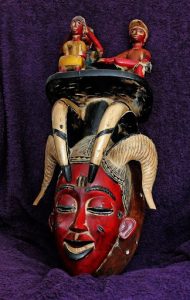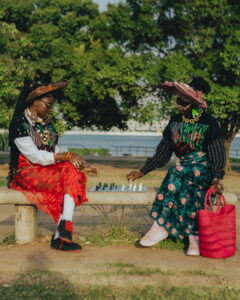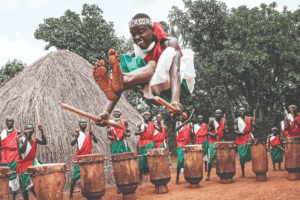
Written by Kemi Adedoyin
Where the Game Starts
Every African man remembers a game. Not just one they played, but one that shaped them.
In a dusty compound in Kano, boys chase each other through a chalk-drawn game of suwe. In a backyard in Kampala, bottle caps become racecars. In Abidjan, the sharp clap of ampe echoes as girls jump in rhythm, and a boy who wants to join is pulled back, told “that’s not for boys.”
These games were never just games. They were rehearsals and tiny tests of masculinity.
You learned to fight, to joke, to hide pain, to win. You learned what was allowed and what wasn’t. Who to be tough with and when to be silent. You learned that certain emotions had no place under the mango tree, or on the football pitch.
No one ever said it outright. That’s the thing. No one told you: This is what a man does. You just knew not to dance too freely. Not to fall too hard.
Long before African boys grow beards or hold jobs, they carry invisible rules in their bones.
Things We Were Never Told
In many parts of Africa, boyhood is not given time to linger. The shift from boy to man often happens too quickly, and without permission.
You’re rarely sat down and told what a man is. Instead, you learn by watching. Fathers who speak little. Brothers who tough it out. Uncles who never explain their anger. And you copy them, even when you don’t understand what they’re holding back.
One moment you’re hopping over bottle caps with laughter in your throat. The next, someone says, “You’re the man of the house now.” And the games end.

But what do we lose when the games stop? When touch becomes guarded, when softness is mocked, when the boy inside the man is locked away for good?
In the quiet, in private, many African men remember those early years with a kind of ache. They remember the joy of play before performance crept in. They remember the friend who hugged them without hesitation. The uncle who held their hand too long. The laughter that didn’t need defending.
Some of them are finding ways back.
Now, a group of men in their 30s gathers on weekends to play childhood games like igisoro, dara, ludo, and talk about what they wish they’d been told as boys.
They speak, haltingly, about fear. About fathers who never spoke. About the moment they learned to stop crying.
And perhaps, in these games, in these circles, in these small acts of return, a new masculinity is being shaped, one that begins not with power, but with play.
What if African masculinity isn’t something to be fixed or softened but simply remembered?
What if, beneath the tough man in the agbada or suit, the silent boss, the impatient father, there’s a boy still waiting to be seen?
In many traditional African societies, masculinity wasn’t just about protection or provision, it was about presence. A real man was one who stayed. One who nurtured crops and children. One who wept at funerals without shame. One who mentored, held, showed up.

These qualities don’t arrive with age. They are seeded in boyhood in how we are allowed to play, to speak, to grieve, to fail.
Masculinity Has Memory
The future of African masculinity will be shaped in backyards, schoolyards, living rooms, and football fields. It will be shaped by whether boys are told they can cry and climb trees. Whether they are allowed to lose and be loved. Whether they are taught to win without dominance, to lead without violence.
Because the boy who would be a man is always watching, learning, remembering.
And if we give him permission to be full, to laugh, stumble, hold hands, ask for help, maybe the man he becomes will not have to break to feel whole.








Don’t miss a thing! Sign up to get new content sent directly to your inbox.